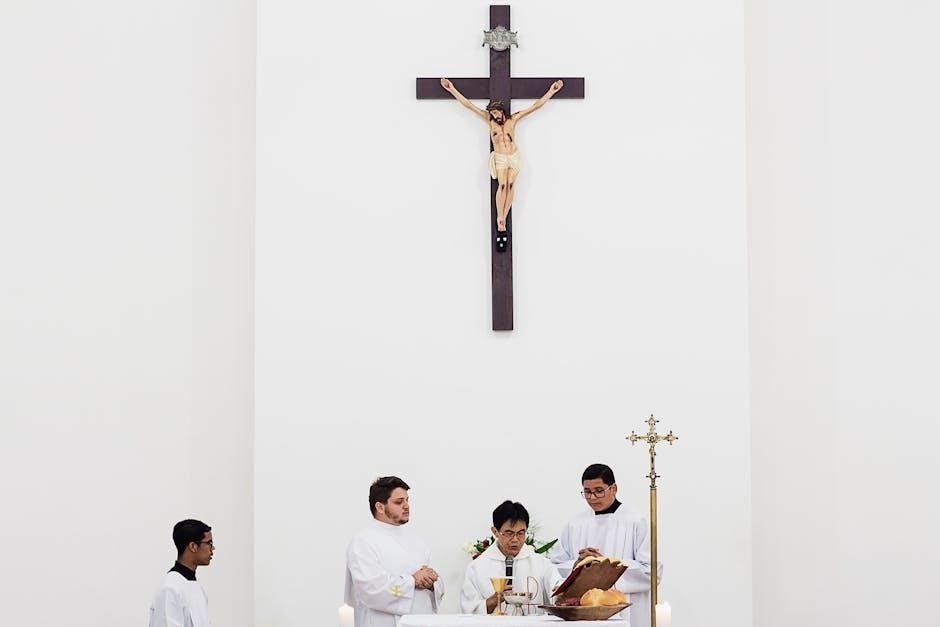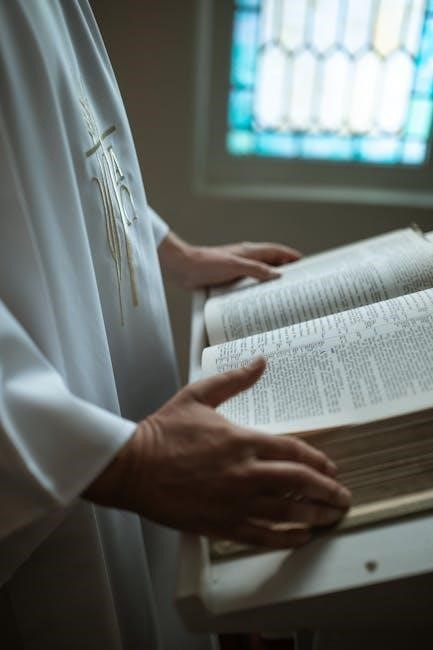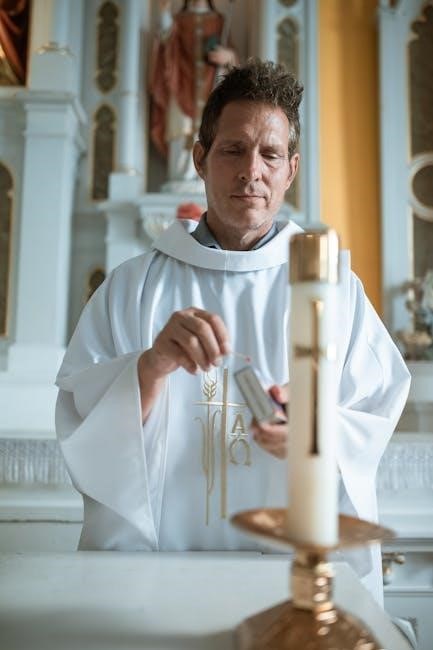7 sacraments of the catholic church pdf
The seven sacraments‚ instituted by Christ‚ are vital for a Christian’s spiritual journey. They mark life’s significant moments‚ providing grace and strength. Divided into initiation‚ healing‚ and vocation‚ they guide believers through faith‚ forgiveness‚ and service‚ reflecting the Paschal Mystery’s transformative power in the Church.
1.1. Overview of the Sacraments
The seven sacraments of the Catholic Church are essential for a Christian’s spiritual journey. Instituted by Christ‚ they are visible signs of God’s grace‚ guiding believers through life’s key moments. These sacred rituals are divided into three categories: Sacraments of Initiation‚ Healing‚ and Vocation. Baptism‚ Confirmation‚ and the Eucharist initiate one into the faith‚ while Penance and the Anointing of the Sick provide healing. Holy Orders and Matrimony are sacraments of service and vocation. Each sacrament has a specific minister‚ form‚ and effect‚ as outlined in the Catechism. Together‚ they embody the Paschal Mystery‚ offering grace and strength for living a faithful life. The sacraments are not merely rituals but encounters with Christ‚ transforming the believer and deepening their relationship with God.
1.2. Historical and Biblical Foundation
The sacraments are rooted in the Bible and the life of Jesus Christ. The Paschal Mystery‚ comprising Christ’s Passion‚ Resurrection‚ and Ascension‚ is central to their institution. Baptism‚ for instance‚ is prefigured in the Old Testament and explicitly established by Christ in the New Testament. The Eucharist originates from the Last Supper‚ where Jesus instituted the sacrament of His Body and Blood. Confirmation draws from the descent of the Holy Spirit at Pentecost. The sacraments are not mere human inventions but are grounded in divine revelation and the actions of Christ‚ as recorded in Scripture. The Church‚ guided by Tradition‚ has developed and understood these sacraments‚ ensuring their celebration reflects their biblical origins and the teachings of the early Christian community. The Catechism of the Catholic Church affirms this historical and biblical foundation.

The Sacraments of Initiation
Baptism‚ Confirmation‚ and the Eucharist welcomed Christians into the Church. These sacred rituals marked the beginning of a lifelong journey of faith‚ grace‚ and unity with God.
2.1. Baptism: The Gateway to Christian Life
Baptism is the foundational sacrament‚ initiating individuals into the Christian faith. It symbolizes spiritual rebirth through water and the Holy Spirit‚ forgiving original sin. This rite‚ rooted in Jesus’ baptism in the Jordan‚ cleanses the soul and incorporates the baptized into the Church. The sacrament is typically administered by immersion or pouring‚ with prayers invoking the Holy Trinity. Baptismal vows renounce evil and profess faith in God. It is a necessary step for receiving other sacraments and living a life guided by divine grace. Through Baptism‚ believers become adopted children of God‚ receiving the indelible mark of a Christian.
2.2. Confirmation: Strengthening of Faith
Confirmation is a sacrament that deepens the spiritual life of the baptized‚ strengthening their faith and bond with the Church. Rooted in the descent of the Holy Spirit at Pentecost‚ it equips believers with the gifts of the Spirit—wisdom‚ knowledge‚ understanding‚ counsel‚ fortitude‚ piety‚ and fear of the Lord. The sacrament is conferred through the imposition of hands and anointing with chrism‚ symbolizing the outpouring of the Holy Spirit. It prepares individuals to witness their faith courageously and actively participate in the Church’s mission. Confirmation completes the grace of Baptism‚ empowering Christians to live as disciples of Christ and face life’s challenges with renewed spiritual vigor and commitment to their faith.
2.3. Holy Eucharist: The Source and Summit of Christian Life
The Holy Eucharist‚ often referred to as the “source and summit” of Christian life‚ is the sacrament where bread and wine are transformed into the Body and Blood of Christ. Instituted by Jesus at the Last Supper‚ it is both a sacrifice and a sacred meal‚ fostering unity with God and the Church. Through the Eucharist‚ believers receive spiritual nourishment‚ deepening their relationship with Christ and strengthening their commitment to live as His disciples. The sacrament is central to Catholic worship‚ embodying the Paschal Mystery and renewing the gift of salvation. It calls the faithful to unity‚ love‚ and service‚ while sustaining them on their journey toward eternal life.

The Sacraments of Healing
The Sacraments of Healing‚ Penance and Anointing of the Sick‚ restore spiritual and physical health. They offer forgiveness‚ mercy‚ and comfort‚ guiding believers toward reconciliation with God and the Church.
3.1. Penance (Reconciliation): Forgiveness and Mercy
Penance‚ or Reconciliation‚ is a sacrament of healing where believers seek forgiveness for sins. Through confession to a priest‚ individuals receive absolution‚ restoring their relationship with God and the Church. This sacrament emphasizes God’s mercy and the possibility of spiritual renewal. It involves contrition‚ confession of sins‚ and performing penance to express sorrow and commitment to change. Penance is a powerful means to receive grace‚ strengthen faith‚ and live a more virtuous life‚ reflecting Christ’s forgiveness and love. It is a vital part of Christian life‚ especially during Lent‚ and fosters reconciliation within the community of believers.
3.2. Anointing of the Sick: Spiritual and Physical Healing
The Anointing of the Sick is a sacrament of healing‚ offering spiritual and physical renewal to those facing serious illness or old age. Administered by a priest‚ it involves the anointing of the forehead and hands with blessed oil‚ symbolizing healing and strength. Rooted in James 5:14-15‚ this sacrament provides forgiveness of sins‚ comfort‚ and peace‚ preparing the faithful for eternal life. It is not limited to the dying but is available to anyone in need of healing. The Church emphasizes that this sacrament is a testament to God’s mercy and care‚ bringing solace to the afflicted and their families‚ while reaffirming hope in Christ’s redemptive power.

The Sacraments of Vocation and Service
The Sacraments of Vocation and Service guide individuals in their life’s purpose‚ fulfilling God’s plan through love and dedication. They include Holy Orders and Matrimony‚ emphasizing service‚ commitment‚ and spiritual growth in unique ways‚ shaping the Church’s mission and family life.
4.1. Holy Orders: Ministry in the Church
Holy Orders is a sacrament that consecrates individuals to serve the Church through ordained ministry. It is conferred in three degrees: bishops‚ priests‚ and deacons. Bishops lead dioceses‚ priests serve parishes‚ and deacons assist in ministry and charitable works. This sacrament is a lifelong commitment to spiritual leadership‚ guiding the faithful in worship‚ teaching‚ and service; Through Holy Orders‚ the Church continues Christ’s mission‚ ensuring the Eucharist and other sacraments are available to the faithful. It is a vital sacrament for the Church’s structure and mission‚ emphasizing service‚ sacrifice‚ and dedication to God’s people. Holy Orders reflects the Church’s need for ordained ministers to carry out its divine mandate and nurture the spiritual life of the community.
4.2. Matrimony: Sacrament of Love and Commitment
Matrimony is a sacrament that unites a man and a woman in a lifelong‚ exclusive bond of love and mutual support. It reflects God’s love and is a covenant symbolizing Christ’s union with the Church. Through this sacrament‚ couples are called to live in fidelity‚ mutual respect‚ and openness to children‚ fostering a Christian family. The sacrament is administered by the couple themselves‚ with the priest serving as a witness. Matrimony emphasizes the dignity of marriage as a divine institution‚ rooted in the natural order and elevated by grace. It is a public commitment that mirrors the eternal‚ self-giving love of God‚ enriching the couple’s journey of faith and service to one another and society.

Key Principles and Teachings
The sacraments are divine gifts that convey God’s grace‚ transforming believers through visible signs. Rooted in the Paschal Mystery‚ they reflect Christ’s redeeming love‚ guiding faith and life in the Church.
5.1. Grace and the Sacraments
Grace‚ God’s free and undeserved gift‚ is bestowed through the sacraments‚ which are divine instruments of spiritual growth. Each sacrament imparts specific graces‚ such as baptismal regeneration or the strengthening of faith in confirmation. The Eucharist‚ as the “source and summit‚” nourishes believers with Christ’s presence. Penance restores grace through forgiveness‚ while the Anointing of the Sick offers healing and comfort. Holy Orders and Matrimony confer graces for sacred ministry and lifelong commitment. Grace transforms individuals‚ enabling them to live as children of God and fulfill their vocations. The sacraments are not mere rituals but effective signs of God’s love‚ making His grace accessible in every stage of life. Through them‚ believers grow in holiness and unity with Christ and His Church.
5.2. The Paschal Mystery and Its Connection to the Sacraments
The Paschal Mystery—Christ’s Passion‚ Resurrection‚ and Ascension—is the heart of the Church’s worship and the foundation of the sacraments. Each sacrament participates in this mystery‚ drawing believers into Christ’s redemptive act. Baptism immerses us in His death and resurrection‚ Eucharist reenacts His sacrificial love‚ and Confirmation strengthens us with the Holy Spirit. Penance reconciles us through His mercy‚ while Anointing of the Sick heals through His suffering. Holy Orders and Matrimony reflect Christ’s mission and love. The sacraments are not isolated rituals but extensions of the Paschal Mystery‚ enabling believers to share in Christ’s victory over sin and death. Through them‚ the Church celebrates and lives out the transformative power of His resurrection‚ leading to eternal life.
The seven sacraments‚ rooted in the Paschal Mystery‚ guide believers through life’s journey‚ offering grace‚ healing‚ and mission. They are the Church’s lifeblood‚ connecting us to Christ’s redemptive love and transforming our lives through faith and devotion.
6.1. The Role of the Sacraments in the Life of the Church
The sacraments are the lifeblood of the Catholic Church‚ connecting believers to Christ and his redemptive work through tangible signs of grace. They mark every significant moment in a Christian’s life‚ from birth to death‚ providing spiritual nourishment and strength. By participating in the sacraments‚ the faithful experience God’s love and mercy‚ fostering a deeper relationship with Him. The sacraments also unite the Church as a community‚ reinforcing its mission to spread the Gospel. They are not just individual experiences but communal celebrations that reflect the Church’s identity and purpose; Through the sacraments‚ the Paschal Mystery is made present‚ transforming lives and drawing believers closer to their ultimate union with God.

